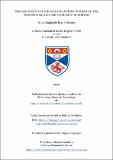The bad guys with the good solutions? Energy elites, transitions, and the 'good life' in Norway
Abstract
In this thesis I examine how strategically situated energy industry professionals conceptualise and act upon energy transitions in Norway. Analytically I refer to interlocutors as ‘energy elites’. This allows me to highlight their shared socio-economic, educational, and professional positionalities while showing key distinctions in their perceptions of energy.
I draw on 18 months of ethnographic fieldwork in Oslo between 2018-2020 where I engaged with over 100 industry leaders and experts. I conducted fieldwork at the formal office spaces of Norway’s major energy corporations and in the private spaces that interlocutors inhabited. This allows me to make three main contributions:
Firstly, I use my detailed ethnographic insights to counter dominant scholarly presumptions that see elites as resisting socio-economic changes in order to preserve their own status. I demonstrate that the way my interlocutors engaged with energy transitions involved personal, societal, and ethical considerations of how energy production can ensure a ‘good life’. Thus, I argue that strategic pursuits alone cannot account for the varied ways in which industry professionals engaged with energy transitions.
Secondly, I expand on the regional literature by critically examining dominant narratives of a ‘successful’ Norwegian energy model. I analyse how increasingly industry professionals scrutinised the socio-environmental sustainability of their hydrocarbon and renewable energy production in light of growing climate change concerns.
Lastly, I contribute to the study of energy transitions, as I analyse them as liminal, in-between processes marked by contestation and ambiguity. I suggest that various energy imaginaries make energy transitions uncertain ‘rites of passages’ without clearly defined end goals or pathways. By advancing scholarship on elites, energy, and transitions, my study demonstrates that contested visions of energy futures are united in their desires for a ‘good life’.
Type
Thesis, PhD Doctor of Philosophy
Rights
Creative Commons Attribution-NonCommercial-NoDerivatives 4.0 International
http://creativecommons.org/licenses/by-nc-nd/4.0/
Collections
Except where otherwise noted within the work, this item's licence for re-use is described as Creative Commons Attribution-NonCommercial-NoDerivatives 4.0 International
Items in the St Andrews Research Repository are protected by copyright, with all rights reserved, unless otherwise indicated.
Related items
Showing items related by title, author, creator and subject.
-
Roadmap on energy harvesting materials
Pecunia, Vincenzo; Silva, S Ravi P; Phillips, Jamie D; Artegiani, Elisa; Romeo, Alessandro; Shim, Hongjae; Park, Jongsung; Kim, Jin Hyeok; Yun, Jae Sung; Welch, Gregory C; Larson, Bryon W; Creran, Myles; Laventure, Audrey; Sasitharan, Kezia; Flores-Diaz, Natalie; Freitag, Marina; Xu, Jie; Brown, Thomas M; Li, Benxuan; Wang, Yiwen; Li, Zhe; Hou, Bo; Hamadani, Behrang H; Defay, Emmanuel; Kovacova, Veronika; Glinsek, Sebastjan; Kar-Narayan, Sohini; Bai, Yang; Kim, Da Bin; Cho, Yong Soo; Žukauskaitė, Agnė; Barth, Stephan; Fan, Feng Ru; Wu, Wenzhuo; Costa, Pedro; del Campo, Javier; Lanceros-Mendez, Senentxu; Khanbareh, Hamideh; Wang, Zhong Lin; Pu, Xiong; Pan, Caofeng; Zhang, Renyun; Xu, Jing; Zhao, Xun; Zhou, Yihao; Chen, Guorui; Tat, Trinny; Ock, Il Woo; Chen, Jun; Graham, Sontyana Adonijah; Yu, Jae Su; Huang, Ling-Zhi; Li, Dan-Dan; Ma, Ming-Guo; Luo, Jikui; Jiang, Feng; Lee, Pooi See; Dudem, Bhaskar; Vivekananthan, Venkateswaran; Kanatzidis, Mercouri G; Xie, Hongyao; Shi, Xiao-Lei; Chen, Zhi-Gang; Riss, Alexander; Parzer, Michael; Garmroudi, Fabian; Bauer, Ernst; Zavanelli, Duncan; Brod, Madison K; Malki, Muath Al; Snyder, G Jeffrey; Kovnir, Kirill; Kauzlarich, Susan M; Uher, Ctirad; Lan, Jinle; Lin, Yuan-Hua; Fonseca, Luis; Morata, Alex; Martin-Gonzalez, Marisol; Pennelli, Giovanni; Berthebaud, David; Mori, Takao; Quinn, Robert J; Bos, Jan-Willem G; Candolfi, Christophe; Gougeon, Patrick; Gall, Philippe; Lenoir, Bertrand; Venkateshvaran, Deepak; Kaestner, Bernd; Zhao, Yunshan; Zhang, Gang; Nonoguchi, Yoshiyuki; Schroeder, Bob C; Bilotti, Emiliano; Menon, Akanksha K; Urban, Jeffrey J; Fenwick, Oliver; Asker, Ceyla; Talin, A Alec; Anthopoulos, Thomas D; Losi, Tommaso; Viola, Fabrizio; Caironi, Mario; Georgiadou, Dimitra G; Ding, Li; Peng, Lian-Mao; Wang, Zhenxing; Wei, Muh-Dey; Negra, Renato; Lemme, Max C; Wagih, Mahmoud; Beeby, Steve; Ibn-Mohammed, Taofeeq; Mustapha, K B; Joshi, A P (2023-08-07) - Journal articleAmbient energy harvesting has great potential to contribute to sustainable development and address growing environmental challenges. Converting waste energy from energy-intensive processes and systems (e.g. combustion ... -
The BRICS, energy security, and global energy governance
Fumagalli, Matteo (World Scientific, 2020-03) - Book itemRecent developments and shifts in global energy markets have brought adjustments to how consuming countries pursue energy security, here understood in terms of the accessibility, affordability, efficiency and environmental ... -
The cost of virtue : reward as well as feedback are required to reduce user ICT power consumption
Yu, Yi; Bhatti, Saleem N. (ACM, 2014-06-11) - Conference itemWe show that students in a school lab environment will change their behaviour to be more energy efficient, when appropriate incentives are in place, and when measurement-based, real-time feedback about their energy usage ...


